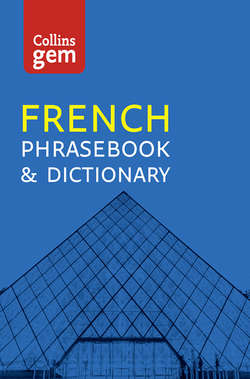Читать книгу Collins Gem - Collins Dictionaries - Страница 10
ОглавлениеHello/goodbye, yes/no
You will find the French quite formal in their greetings, shaking hands both on meeting and on parting. French people, when they know each other well, greet each other with a kiss on each cheek. Bonjour, madame or bonjour, monsieur are the politest ways to greet someone. Mademoiselle is becoming less frequently used. Salut is more informal than bonjour. If someone offers you something, perhaps an extra serving of food, and you simply reply merci, they will take this to mean ‘no’. You must say oui, merci or you will go hungry!
| Please | S’il vous plaît seel voo pleh |
| Thanks (very much) | Merci (beaucoup) mehr-see (boh-koo) |
| You’re welcome! | De rien! duh ryañ! |
| Yes | Oui wee |
| No | Non noñ |
| Yes, please | Oui, merci wee, mehr-see |
| No, thanks | Non, merci noñ, mehr-see |
| OK! | D’accord! da-kor! |
| Sir/Mr | Monsieur/M. muh-syuh |
| Madam/Mrs/Ms | Madame/Mme ma-dam |
| Miss | Mademoiselle/Mlle mad-mwa-zel |
| Hello/Hi | Bonjour/Salut boñ-zhoor/sa-lew |
| Goodbye/Bye | Au revoir/Salut oh ruh-vwar/sa-lew |
| Bye for now | À bientôt a byañ-toh |
| Good evening | Bonsoir boñ-swar |
| Goodnight | Bonne nuit bon nwee |
| See you tomorrow | À demain a duh-mañ |
| Excuse me! (to catch attention) | Pardon, monsieur/madame! par-doñ, muh-syuh/ma-dam! |
| Sorry! | Pardon! par-doñ! |
| I’m sorry | Je suis désolé(e) zhuh swee day-zo-lay |
| How are you? | Comment allez-vous? ko-mahñ ta-lay voo? |
| Fine, thanks | Très bien, merci treh byañ, mehr-see |
| And you? | Et vous? ay voo? |
| I don’t understand | Je ne comprends pas zhuh nuh koñ-prahñ pa |
| I speak very little French | Je parle très peu le français zhuh parl treh puh luh frahñ-seh |
